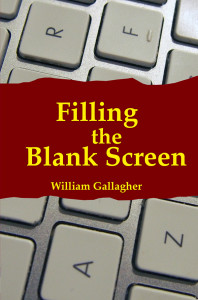 Last year, The Blank Screen book captured every single thing I knew about being a productive yet still creative writer. How to beat distractions. Get started. Cope with the day job, cope with deadlines, cope with other people – and cope with yourself too. There’s also an astonishingly popular bit in it about kettles. Tea-making aside, I am deeply proud of how useful the book has proved to people. Actually, hang on, how about this quote?
Last year, The Blank Screen book captured every single thing I knew about being a productive yet still creative writer. How to beat distractions. Get started. Cope with the day job, cope with deadlines, cope with other people – and cope with yourself too. There’s also an astonishingly popular bit in it about kettles. Tea-making aside, I am deeply proud of how useful the book has proved to people. Actually, hang on, how about this quote?
“Love this book, it is clever and witty and genuinely grapples with making an extra hour (or two) in the day. Inspiring and liberating. A real Can-Do manual. No creative should be without it.”
That was an out-of-the-blue email from Barbara Machin, creator of BBC’s Waking the Dead. Made my day, didn’t it? So did getting tweets at 5am from people saying they had finally finished their novels because of what I’d told them. Okay, being up and working and able to tweet right back at them that second was part of the fun.
But that’s the thing. People. The Blank Screen book became a workshop that I have now done all over the country. I’ve done versions for individuals – that’s intense but fantastic: ask me about that – and I’ve spoken at literary festivals, in universities, I’ve worked with new and amateur writers, I’ve worked with long-time professionals. Next week I’m in Newcastle and it is to spend a day with writers but also with journalists, musicians and actors. People who have to create, whose passion is in creating new work but who are having to do more of that and do it alongside so many other jobs that their creativity is under pressure. The work they live to do is being squeezed to one side like the credits on a TV show while they are having to run businesses or get day jobs.
I know that what I’ve got for them will help with everything they’re doing. That’s a great feeling, to actually know that this works. But what’s greater, for me personally, is that I do not know what they’ve got for me. I just know that they will have something.
It’s more or less exactly a year since The Blank Screen first came out and now I’ve learnt so much from so many people that I’m ecstatic to tell you today sees the official publication of a new book: Filling the Blank Screen. One hundred chapters of advice, tips, recommendations and daft anecdotes from a year of making more people more productive.
This new book is actually a distillation of more than a thousand articles on The Blank Screen news site and of more than a quarter of a million words written on there since November 2013. One hundred of the best, the most-talked about and the most-read pieces have been continued, developed, updated and given a nice scrub to make this new ebook. If you and I have talked at a workshop, I have stolen your brilliant idea and it’s in chapter 3.
Filling the Blank Screen is due to be released in paperback on 12 September and the ebook is out today.
The aim of this new book is not to replace The Blank Screen, I still know that will be useful to you and I hope also entertain. But Filling the Blank Screen is a burst of bite-sized pieces you can grab on the run and which tell you what to do to get things done. Read one piece a day and in a hundred days you’ll have had a good time and I’ll have the reputation for writing long books.
Everybody wins and it costs you only £2.99.
Quick aside? Since it’s you? Filling the Blank Screen is not the book I was planning to write this year. It really did come out of the unexpected success of the workshops and the news site. It felt like it was the book itself that wanted to be written. Which is startling and great, obviously, and I’m dancing here, but still it is not the book I was planning to write. Which means I am deep into the planned book and that’s what I should be working on right now. If only there were a couple of books out with great and tested advice about getting writing finished and beating distractions and putting the kettle on this minute.
It is a treat that I get to tell you these things. Thanks.